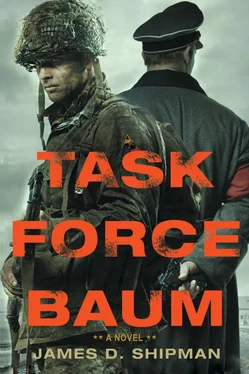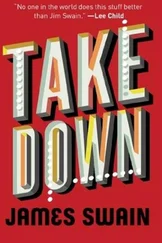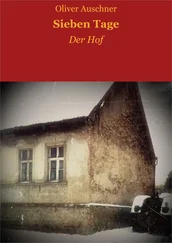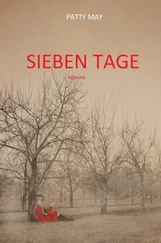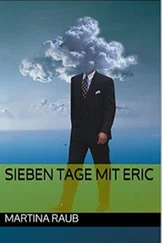“Step it up,” he ordered. “We’ve got to get there in time.”
“Sir, any faster and we may lose the engine,” reported Schmidt.
“I don’t care. Push it.”
The sergeant put a hand on Koehl’s leg, looking up with understanding eyes. “I understand, sir, but do you want another delay? If we lose a vehicle or two, we might not be able to go on at all. A little caution now will pay dividends.”
Koehl wanted to lash out at Schmidt. As much as the sergeant was his friend, he could not feel the emotions ripping through the captain right now. He held back. They’d served together for years. Seen and done things nobody would possibly believe. “You’re right,” he said finally. “Get as much speed as you can, but get us there intact.”
“Don’t you worry, sir, we’ll beat those bastards to the Oflag, and we’ll give them a nasty surprise when we do.”
Koehl hoped the sergeant was right. Images of his sister kept flaring up in his imagination. He saw her sitting across from him at dinner, smiling, laughing; then the scene changed, and she was in a field, eyes wide open, blood smattered over her delicate cheeks and pale skin. Surrounded by laughing GIs. He shook his head, trying to drive the nightmare away. There was only one thing he could think of to atone for her loss, for his hesitation, his weakness.
The column was entering the hills now, winding up steeply through the trees. He consulted his map, trying to determine where to go. The area was crisscrossed with small roads, zigzagging through the sharply inclining landscape. He traced his finger along the probable routes from Hammelburg toward the Oflag and compared the two-dimensional lines with his recollections of their recent training here.
As he did so, he recalled an area that would be perfect for what he had in mind, a clearing halfway up a hill, behind a line of trees that hovered over the main road from the town. He would be able to line up his entire company and hit the column in a massive broadside. If he placed his infantry on the other side, he would have the Americans in a cross fire, and with any luck, he could wipe out the whole force in a matter of minutes. If only he could find his way there. He’d never approached this area from the west. He didn’t know the roads from this side, and he was unsure of exactly where to go. In the bumping, rumbling vehicle, he could barely concentrate on the map. He felt a terrible frustration, but he would have to stop the column and spend a few minutes mapping out their route.
He gave the order to Schmidt, and the line of Ferdinands stumbled to a halt. He pulled the map up closely and traced the routes, trying to find the meadow on the chart. It wasn’t marked, but he thought he could see in his mind the approximate location. If he was right, they were not far, less than a kilometer. They would have to cut over to another road, but he saw an area that would allow them to get there. He gave these new instructions to Schmidt, and soon the anti-tank vehicles were moving again, headed toward the ambush point.
They arrived at the crossroads in less than five minutes. The force took a sharp right and lumbered up another road, this one a little bigger and paved. To his left, right on cue, was the line of trees. Koehl could see the clearing popping out through the maze of branches and pine needles. He’d led them straight to it, he realized with elation.
“We’re here, Schmidt,” he said.
“We’re where?”
“The ambush point. There is a small road leading up into that clearing in about a hundred meters. I want all the Ferdinands up there, lined up downhill, spread out ten meters apart. The infantry should be on the other side. We don’t have much time, so everyone must get into position as quickly as possible.”
Schmidt started giving orders but was interrupted by headquarters. The sergeant listened for a few seconds, then turned to the captain. “The colonel was right. They didn’t hit Hammelburg,” he said, his voice trembling with energy. “They’re coming this way.”
Koehl could barely contain his excitement. The Americans were heading toward the Oflag and right into his trap. He’d arrived first, and he was in position to hit them. He turned back to Schmidt. “You heard it, Sergeant. Get them up there quickly.”
Schmidt barked orders, and the Ferdinands turned off the road, rumbling up through a narrow gap in the trees and into the open meadow beyond. The anti-tank vehicles bumped and jarred their way into place, one after another, leaving a gap that would hopefully prevent a shell from destroying two of them at a time. In less than ten minutes, the vehicles were all in position, their 88mm main cannons reaching out toward the road, waiting like the eager claws of some terrible monster to rip and render the Americans. In the distance through the trees, Koehl could see his infantry scrambling into their positions. The ground troops would be terribly exposed once the fighting started and stood in danger of taking a stray round from the Germans in the coming cross fire. They were brave men, all of them. He thought of the engineer. A good man, perhaps, who’d made a mistake. He would make amends when this was over.
Minutes passed. They were in position now, but if anything, the tension elevated with nothing to do but wait. He looked through his field glasses again and again, straining to make out the first American Sherman. Fear nagged him. He remembered the map. There were so many roads. He’d covered the most direct route to the Oflag, but what if the Americans chose another route? There were a half-dozen ways to get to the camp. If they didn’t pass this way, he still might miss them. He looked through the glasses. Still nothing. He checked his watch. It was past time.
“Schmidt,” he said, “get HQ up again. We need that plane to give us an updated position. I think we’ve missed them.”
The sergeant started on the radio communication, but Koehl stopped him. “Delay that order,” he said, his eyes focusing on the first green hint of movement. “They’re coming. Everyone should be prepared to fire once the lead Sherman is all the way past our line.”
Schmidt gave the order. Koehl was full of excitement. He watched the column progressing slowly up the road. He spotted three Shermans, then five. They were lined up before him like ducks in a pond. The captain was worried the Americans would spot him, but they rumbled by tranquilly as if they were out on a peacetime exercise. The force continued, the lead tank approaching the leftward track toward the meadow. Koehl closed his eyes for a moment, whispering a prayer of thanks. “Fire!” he screamed, and the world exploded around him.
Oflag XIII
March 27, 1945, 1230 hours
The thunder in the distance rattled the camp. Knorr hesitated, his pistol to Curtis’s head, then he reversed the handle and brought the base down on the captain’s temple. Curtis felt fire and streaks of lightning-hot pain rip across his forehead; black dots flashed in and out of his vision as he fought to stay conscious. Nausea welled up, and he retched into the frozen dirt of the yard. He scarcely noticed the rumbling of artillery in the distance.
He felt hard hands pulling at his arms. He waited for the bullet that would end his agony. He almost welcomed it amid the wrenching pain of his back and head.
“Curtis”—he heard the familiar voice of Lieutenant Colonel Waters. The hands on him were not German.
“Yes, sir,” he managed to say through the pain.
“We’ve got to get you out of here. Can you stand?”
The captain struggled to rise. Waves of dizziness drove him back to the ground. He closed his eyes, trying to shake off the unbalanced forces tearing through his brain. “I can’t.”
Читать дальше
